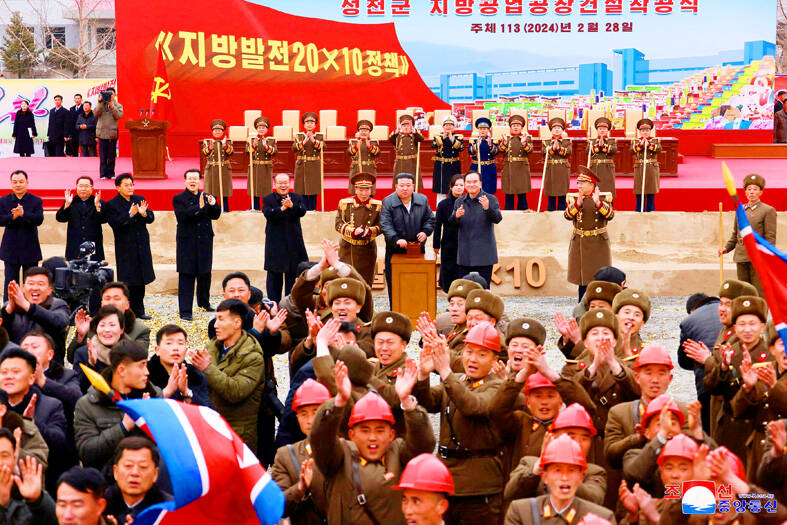The UN yesterday reported on a deeply institutionalized system of forced labor in North Korea, which in some cases could amount to the crime against humanity of enslavement.
In a damning report, the UN Human Rights Office detailed how people in the reclusive and authoritarian country are “controlled and exploited through an widespread, multi-layered system of forced labour.”
“The testimonies in this report give a shocking and distressing insight into the suffering inflicted through forced labour upon people,” UN High Commissioner for Human Rights Volker Turk said in a statement.

Photo: Korean Central News Agency via Reuters
“These people are forced to work in intolerable conditions — often in dangerous sectors with the absence of pay, free choice, ability to leave, protection, medical care, time off, food and shelter,” he said.
Many face regular beatings and women are “exposed to continuing risks of sexual violence,” he said.
The rights office relied on a range of sources for the report, including 183 interviews conducted from 2015 to last year with victims, and witnesses who escaped North Korea and were living abroad.
“If we didn’t meet the daily quota, we were beaten and our food was cut,” said one victim cited in the report.
The latest allegations follow a landmark report published by a UN team of investigators a decade ago that documented forced labor among other rampant rights abuses such as deliberate starvation, rape and torture in North Korea.
Yesterday’s report zeroed in on an institutionalized system, with six different types of forced labor, including during the country’s 10-year minimum military conscription. There were also compulsory state-assigned jobs and the use of revolutionary “Shock Brigades,” or state-organized groups of citizens forced to carry out “arduous manual labor,” often in construction and agriculture, the report said.
Such projects can last for months and even years, during which time workers must live on site and receive little or no remuneration, it found.
There were also other forms of work mobilizations, including of school children, and work performed by people sent abroad to earn foreign currency for the state, the report said.
For instance, North Koreans were reportedly sent to help build facilities ahead of the FIFA World Cup events in Russia and Qatar.
Those sent abroad lose up to 90 percent of their wages to the state, work under constant surveillance and have their passports confiscated, with almost no time off, the report said.
In some instances the level of control and exploitation “may reach the threshold of ‘ownership,’” the report said.
This, it said, might “constitute the crime against humanity of enslavement.”
The most serious concerns surrounded places of detention, where forced labor victims systematically had to work under threat of physical violence and in inhumane conditions, it said.
The report called on the UN Security Council to refer the situation to the International Criminal Court.

The collapse of the Swiss Birch glacier serves as a chilling warning of the escalating dangers faced by communities worldwide living under the shadow of fragile ice, particularly in Asia, experts said. Footage of the collapse on Wednesday showed a huge cloud of ice and rubble hurtling down the mountainside into the hamlet of Blatten. Swiss Development Cooperation disaster risk reduction adviser Ali Neumann said that while the role of climate change in the case of Blatten “still needs to be investigated,” the wider impacts were clear on the cryosphere — the part of the world covered by frozen water. “Climate change and

Packed crowds in India celebrating their cricket team’s victory ended in a deadly stampede on Wednesday, with 11 mainly young fans crushed to death, the local state’s chief minister said. Joyous cricket fans had come out to celebrate and welcome home their heroes, Royal Challengers Bengaluru, after they beat Punjab Kings in a roller-coaster Indian Premier League (IPL) cricket final on Tuesday night. However, the euphoria of the vast crowds in the southern tech city of Bengaluru ended in disaster, with Indian Prime Minister Narendra calling it “absolutely heartrending.” Karnataka Chief Minister Siddaramaiah said most of the deceased are young, with 11 dead

Poland is set to hold a presidential runoff election today between two candidates offering starkly different visions for the country’s future. The winner would succeed Polish President Andrzej Duda, a conservative who is finishing his second and final term. The outcome would determine whether Poland embraces a nationalist populist trajectory or pivots more fully toward liberal, pro-European policies. An exit poll by Ipsos would be released when polls close today at 9pm local time, with a margin of error of plus or minus 2 percentage points. Final results are expected tomorrow. Whoever wins can be expected to either help or hinder the

DENIAL: Musk said that the ‘New York Times was lying their ass off,’ after it reported he used so much drugs that he developed bladder problems Elon Musk on Saturday denied a report that he used ketamine and other drugs extensively last year on the US presidential campaign trail. The New York Times on Friday reported that the billionaire adviser to US President Donald Trump used so much ketamine, a powerful anesthetic, that he developed bladder problems. The newspaper said the world’s richest person also took ecstasy and mushrooms, and traveled with a pill box last year, adding that it was not known whether Musk also took drugs while heading the so-called US Department of Government Efficiency (DOGE) after Trump took power in January. In a